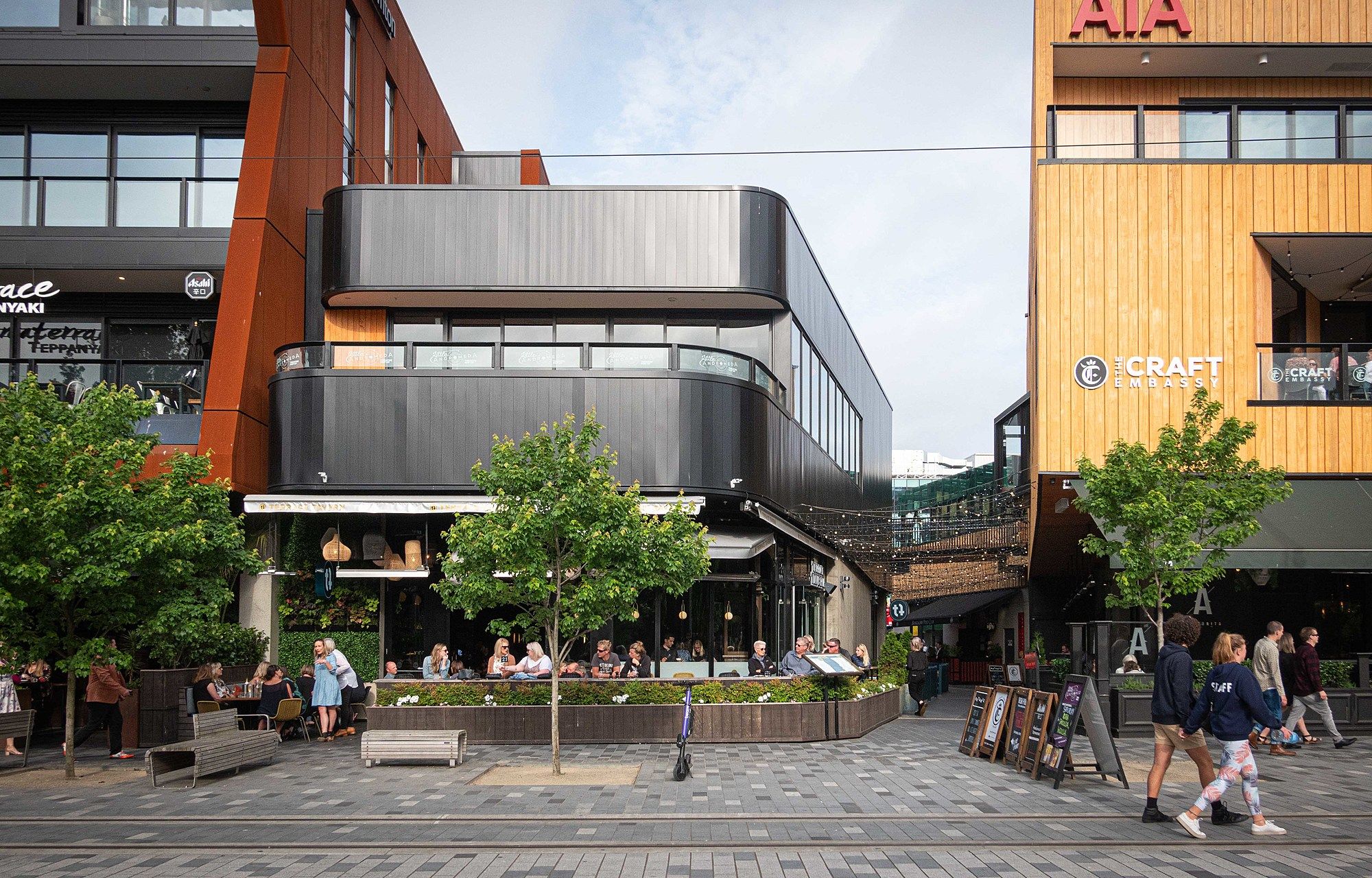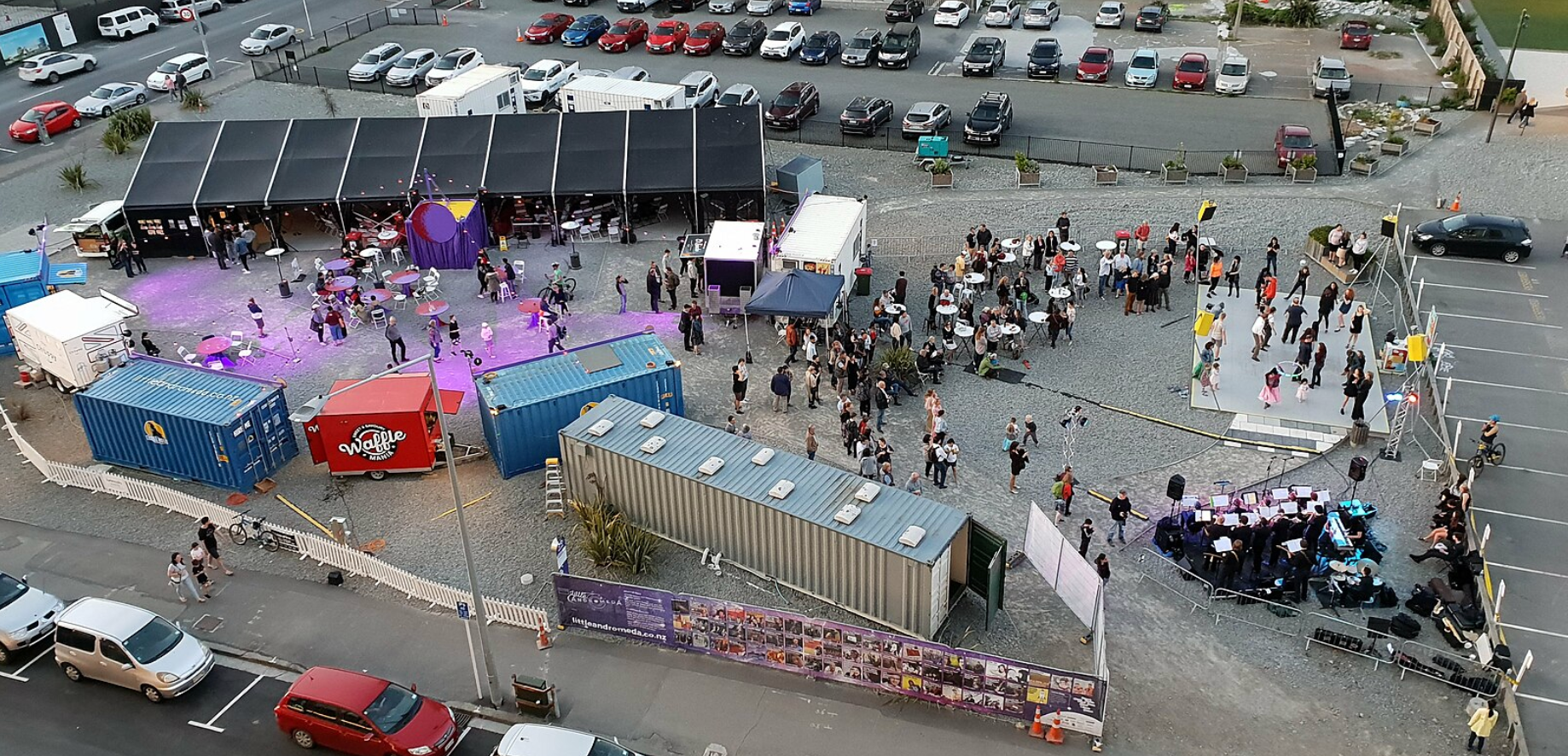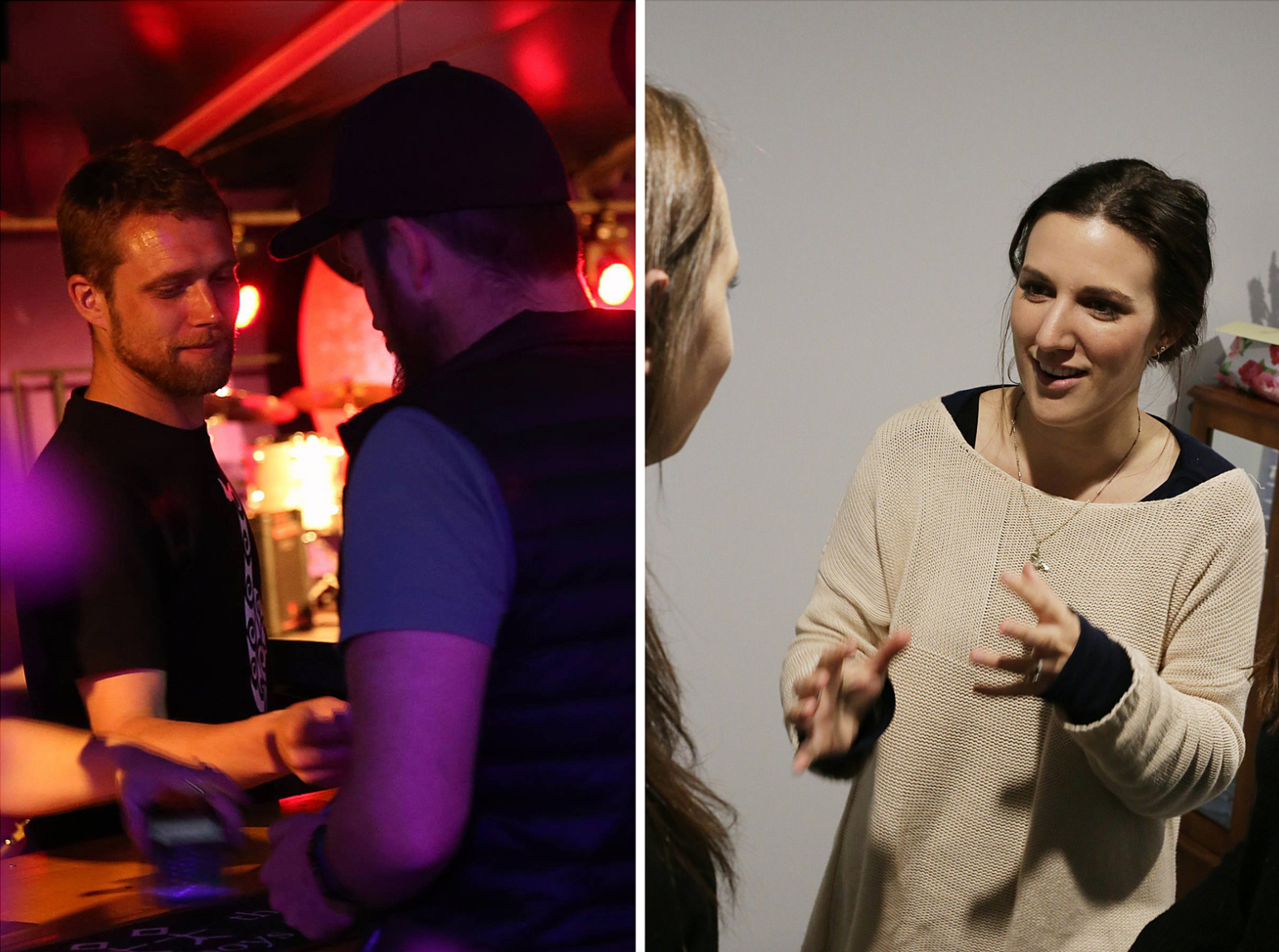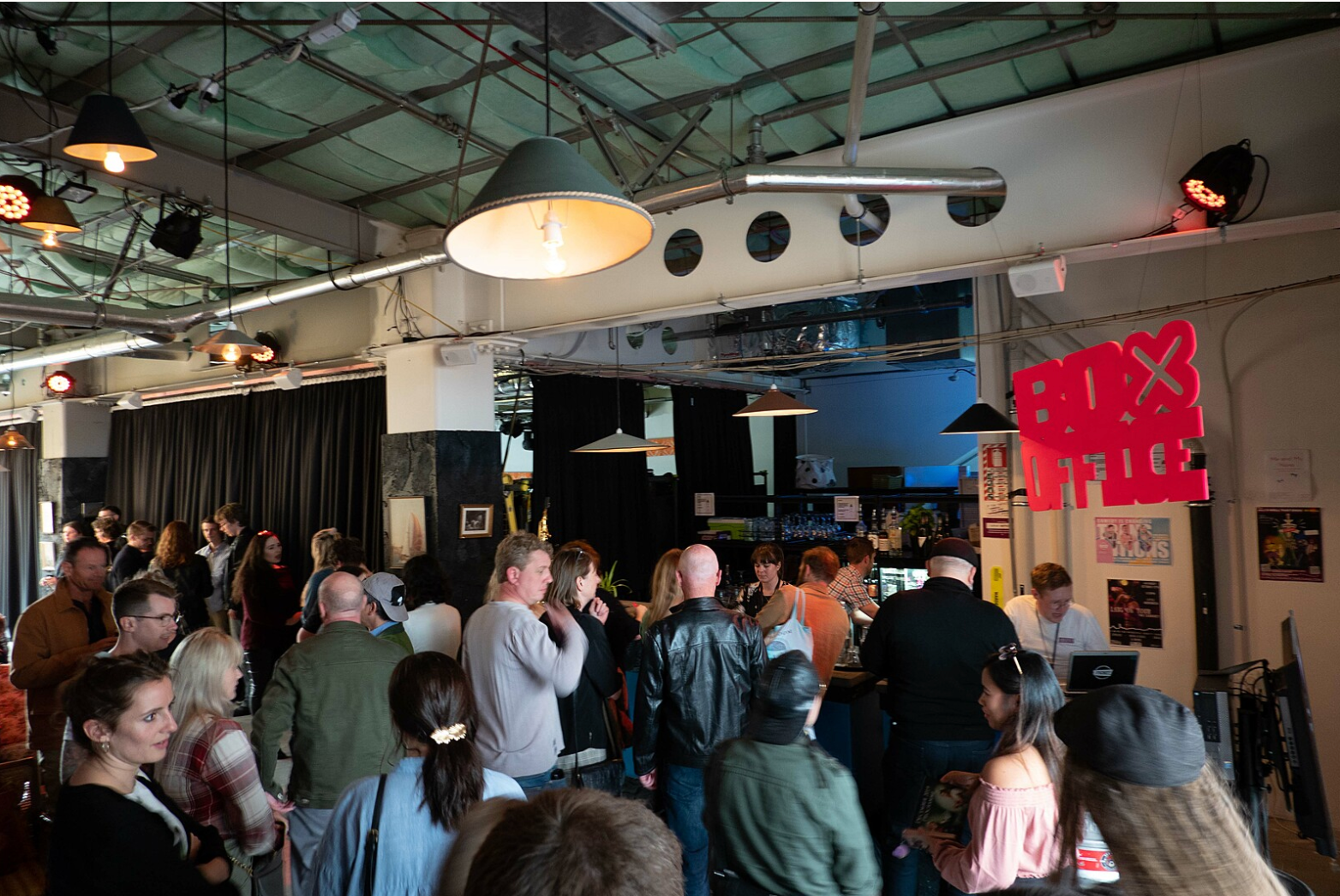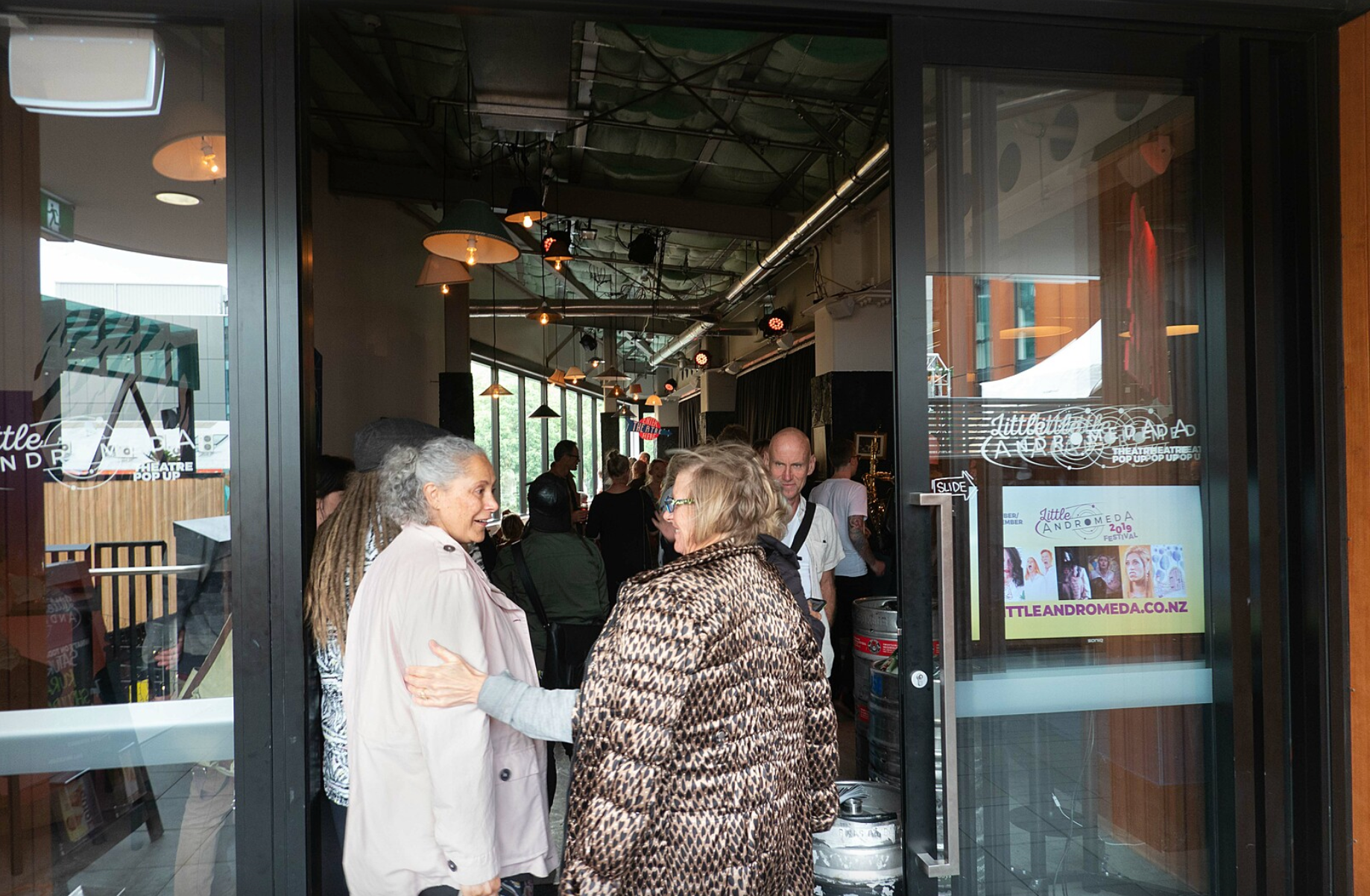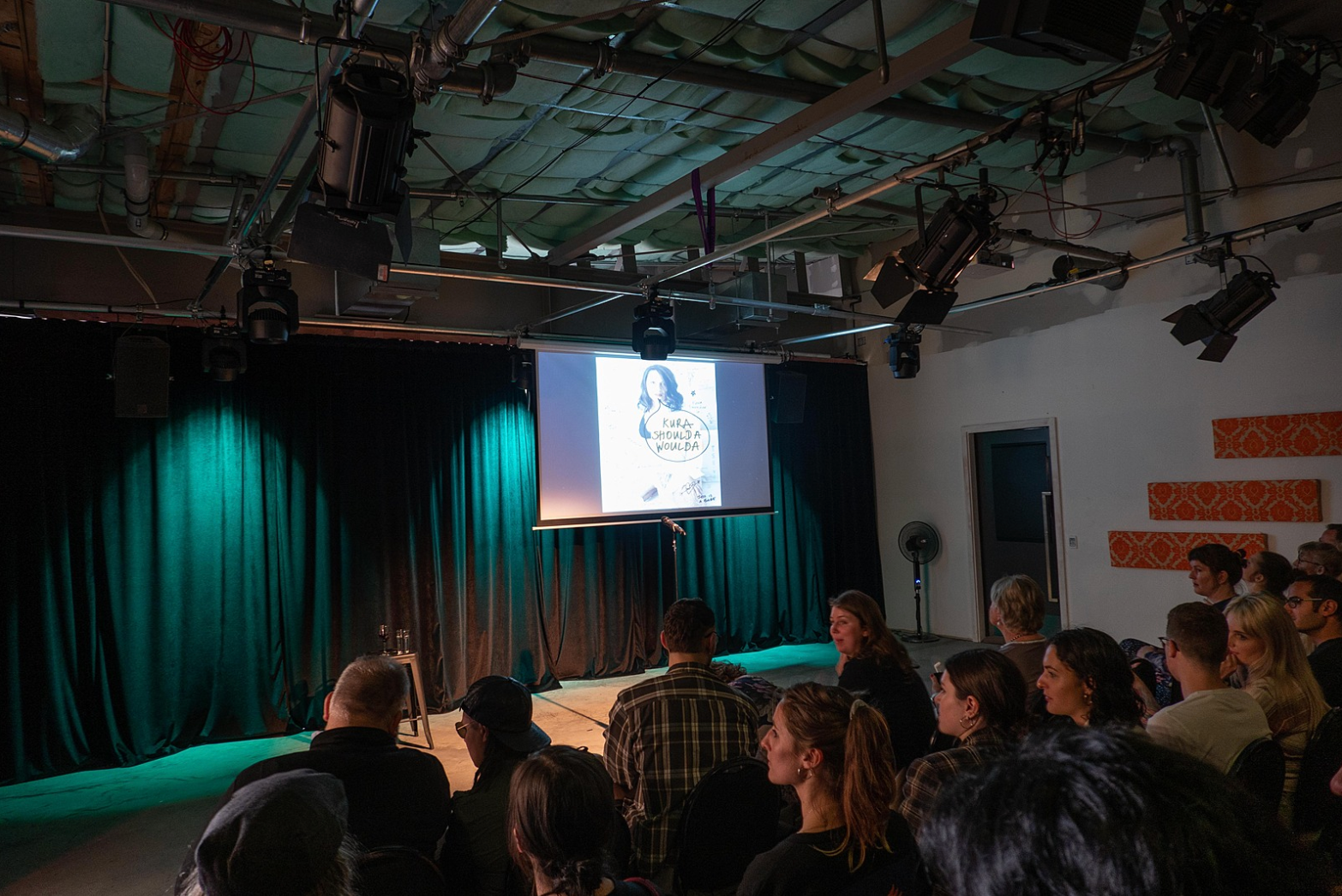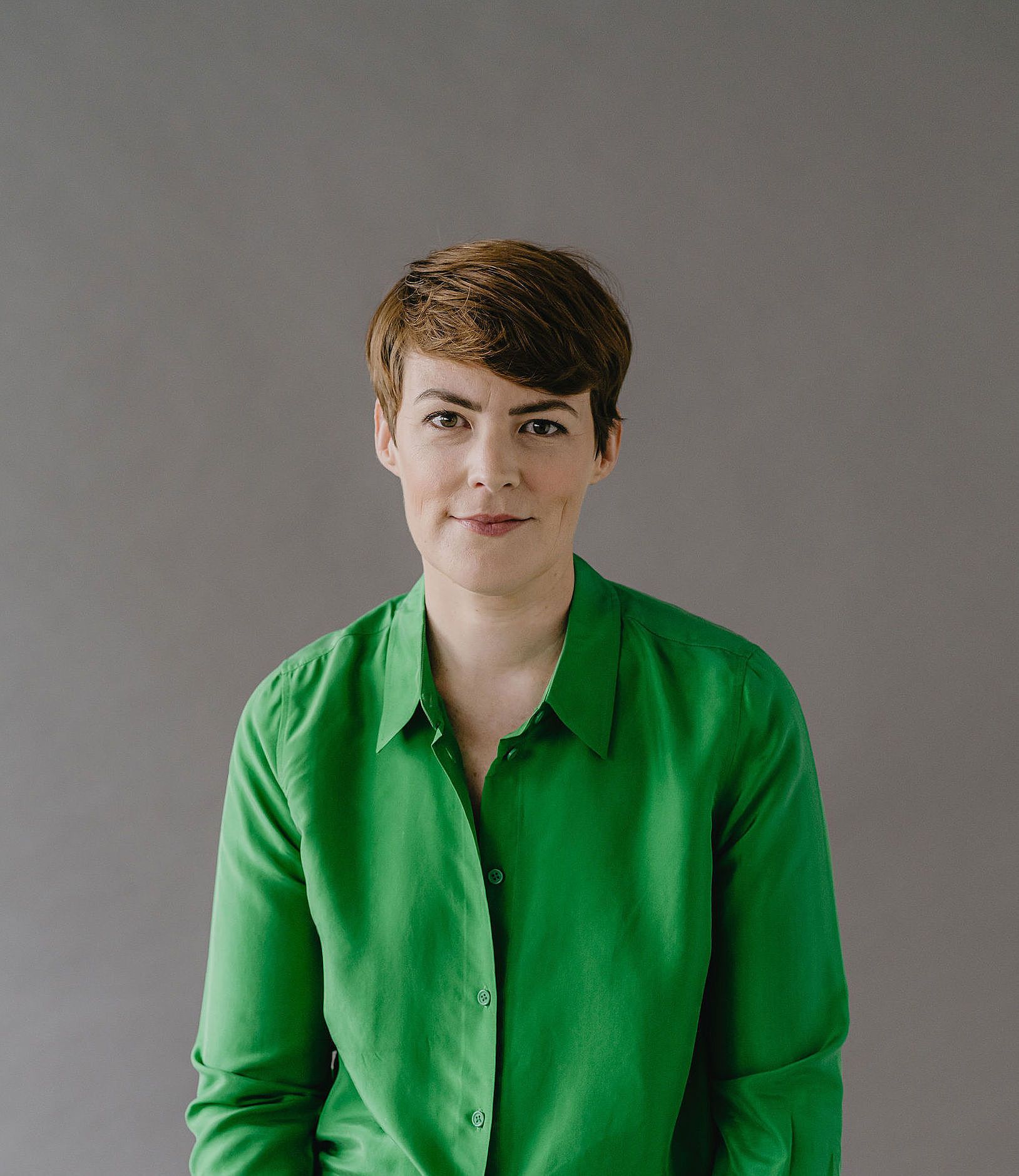From Tent to Terrace: The Most Exciting New Theatre In Aotearoa
In a coup for culture in Ōtautahi, Aotearoa's newest fringe theatre Little Andromeda just announced it can stay open throughout 2020.
In a coup for culture in Ōtautahi, pop-up performance space Little Andromeda has just announced it can stay open throughout 2020. Kate Prior sat down with producer Michael Bell and programmer Holly Chappell-Eason to understand their journey over the last 18 months of fighting for the fringe.
Michael Bell is beaming. Over Skype he’s showing me around his pop-up theatre space Little Andromeda, lifting the laptop high so I can see the saxophone bar-taps and the theatre entrance sign and, outside, the surrounding neighbourhood on The Terrace. I’m offering overly-eager affirmations in response, like he's my eight-year-old nephew and I’m the cool aunty. It’s hard not to. Michael’s downplayed but undeniable pride is so satisfying because it’s so hard won.
In July 2018, Michael discovered that his proposal for Andromeda, a multi-venue theatre and entertainment complex developed over three years for the $30-million designated arts precinct in Ōtautahi had been rejected by the council in favour of the competing proposal from mainstage giant The Court Theatre. As Erin Harrington noted at the time, the proposal offered solutions to various infrastructure issues for performing arts in Ōtautahi. With the head of a producer but the heart of an urbanist, Michael’s pitch wasn't just about empty entertainment spaces, but focussed on cultivating a sense of place for community and artists alike. Most importantly, the proposal included a risk-share performance space for independent companies in the city.
The risk-share model is a significant part of the performing arts landscape in Aotearoa. Both our bastions of the fringe – Wellington’s BATS Theatre and Auckland’s Basement Theatre – are run this way. Rather than independent companies being hit with venue fees upfront, the risk-share model means the venue takes a cut of box office once a show’s season ends. It offers emerging artists the opportunity to flex and experiment without the pressure of outrageous outlay, and within an environment that offers technical and marketing support. Risk-share venues act as a hothouse for emerging talent and add to the life, energy and identity of the city. (You only have to watch Bret McKenzie and Jackie van Beek chatting at BATS last night about what that theatre meant to them in the 90s to get it). Wellington and Auckland are served well, but Ōtautahi has never had such a permanent artistic hub. And unfortunately back in 2018, Christchurch city councillors weren't convinced of the need.
After so much future potential being met with such an almighty hit, Michael was ready to pack out, turn the worker lights off, and say goodbye to the home he cared about so much. “With the council saying no, to me that was the end of the road,” Michael admits. “I was thinking of moving to either Wellington or Melbourne. My aunty who lives in New York was like, ‘Come and have a holiday,’ and I thought, yeah, that’d be nice.”
After so much future potential being met with such an almighty hit, Michael was ready to pack out, turn the worker lights off, and say goodbye to the home he cared about so much
But the 33-year-old producer’s gentle nature belies his tenacity, and the seed of the Andromeda idea just wouldn’t go away. “I blame a few people just calling up and saying, ‘Don’t give up’.” It was enough encouragement to make Michael reconsider. “I thought if I pack my bags now, I’m gonna let down all the people who have supported this far. I felt like I owed it to them to keep trying until there was nothing left to keep trying for.”
One of the biggest uphill battles of Michael’s original pitch had been convincing councillors that there were plenty of artists and companies in Ōtautahi to fill the 150- and 400-seat theatres he was proposing. “Basically I’d done numbers and numbers – I’d listed out all the groups that would use it but they were like, ‘That’s too much of a risk’.” If there were going to be any changed minds, it became clear that what was needed was cold, hard proof. So Michael assembled a trust board and decided that if no one was going to fund a building, he’d pitch a tent.
October 2018 presented the first test: 92 acts over six weeks, in a 300-seat tent in an vacant lot. (The exact same designated arts precinct spot, symbolically, that the Andromeda complex would have occupied). The first Little Andromeda Pop-up Theatre season was packed with shows and created a real buzz in the empty block next to newly-opened Tūranga, but it was tough going: the lights would shake in the wind in a tent that could never go to a blackout and there wasn’t much around for lingering audiences after a show, so food trucks were brought in to offer a sense of atmosphere. On top of that, the trust hadn’t secured all the funding they needed heading into the season so Michael was risking his own money, as well as working on shows nearly every night of the week. Oh, and the weather was often pretty grim. By the time the six weeks came to a close, it had been a whirlwind time, but he was physically and emotionally wrecked.
Yet the trust had achieved what they’d set out to do: prove, overwhelmingly, that Ōtautahi had talent, independent companies, and audiences aplenty to fill a fringe theatre. From the huge outpouring of community support, and from the audiences that continued to turn up and have a great time, it was clear it had to be done again. “But you need a new programmer” said theatre director Holly Chappell-Eason, who’d been supporting from the trust board. So together she and Michael became a team.
The next step was to plan a space for 2019. Michael and Holly weren't ruling out another tent. But real concrete walls? Even better. As a long shot, they decided to approach Antony Gough, the property developer behind the range of hospitality businesses on The Terrace (the better-dressed incarnation of The Strip), in the hope that he may have untenanted space. Armed with a video showing two seconds of all the 92 acts that performed in the tent, and with the healthy dose of pragmatism that comes with positioning non-profit art ventures in front of tough crowds, Michael and Holly pitched to the developer. Incredibly, he didn’t need convincing. I mention to Michael that his pitch must have been great. “I’d like to say that it was,” Michael says, “but Antony was just like, ‘I get it. Let’s do it. Why not’.”
So that was it. For two months in 2019 at least, Little Andromeda was going to have a roof over its head. Best of all, the trust wouldn’t need to pay rent – Gough had agreed to donate the space. Michael was dumbstruck. “I couldn’t believe after years and years of trying to prove to public bodies that it was worth it, he just stepped in and was like, ‘I’ll do it’.”
It feels like where we are now is exactly where we’re meant to be.
The 2019 Little Andromeda Pop-up Theatre season, which presented a whopper 118 shows over nine weeks in a bare-bones space above the Terrace Tavern, wrapped up recently. There were kids’ shows, comedy shows, improv, theatre and music. There’s the saxophone bar taps and possibly the flashest balcony of any fringe theatre in the country. And far from being in a vacant lot, the space is in one of the most newly-vibrant spots in the CBD. After seeing a show, audiences from Little Andromeda can grab dinner or a drink from the surrounding eateries, walk down by the river, or get a legendary souvlaki from Riverside Market. Amongst the audiences there's been a palpable buzz of being excited to be out and seeing a show on the fly, and the surrounding hospo tenants have also loved having the new clientele that the theatre has brought. “We’re just part of the vibe here, which feels very right,” Holly enthuses. “It feels like where we are now is exactly where we’re meant to be.”
To top it all off, near the end of the successful 2019 season, the best thing happened. Michael and Holly gathered the community together for an announcement that Antony Gough would be continuing his offer of rent-free tenancy throughout 2020, which means the trust will be able to operate the theatre on a shared-risk basis into next year. Talking to Stuff, Michael said, “We want to keep going for as long as we can” – the words by which all the very best things start. The glimmer of permanence for a risk-share fringe space in Ōtautahi is now looking all the more bright.
When I saw the announcement for Little Andromeda’s 2020 permanence over a jumpy live Facebook feed, I felt unexpectedly moved. There’s something particularly gratifying about this win for the theatre community in Ōtautahi. Part of that is definitely down to the fact that it’s been such a long road to this point (not only for the Little Andromeda team, but the many others who have aimed to get something similar up over the years). But also, if there’s a city that could benefit the most right now from a permanent, affordable performance space where a range of artists and audiences can come together, share space and tell stories about their people and their city, one that is about a plurality of voices and not a single directorial vision, and one that is connected to the new energy of the city, it’s Ōtautahi.
If there’s a city that could benefit the most right now from a permanent, affordable performance space where a range of artists and audiences can come together, share space and tell stories about their people and their city, it’s Ōtautahi.
Sometimes it’s difficult for those of us who take our civic and communal spaces for granted to understand how it feels living for so long in a city with no centre, or even how important the idea of public space is. “Honestly, the culture in Christchurch changed significantly in the earthquakes,” Michael explains. “No one came into town. Everything was in the suburbs. Going out to things stopped being a thing.” When an atrocity like March 15 intrudes on a city that already had been feeling like a collection of satellites, the effect is devastating. “Everyone’s already in that cycle of being disconnected and then something like that happens and there’s a whole lot of guilt around that disconnectedness.” It’s hard to put into words how a splintered city can collectively feel trauma and shame. But more inclusive public libraries, more family playgrounds, more affordable performance spaces – each feel like steps towards healing.
After speaking with Michael and Holly, I travelled to Ōtautahi to experience Little Andromeda for myself. I walked around The Terrace and watched people spill out of Riverside Market and take their food to sit by the river, and it was clear there’s new life growing in the CBD. There was even a sign for a theatre down a laneway, like it had been there all along. Inside the theatre bar, people sat around on a motley collection of lounge chairs, Michael was pouring the drinks and running around backstage, and even the guy on the box office seemed twinkly, like he couldn’t believe how great this was either.
On the same weekend in Ōtautahi I listened to the asylum seeker and free man Behrouz Boochani talk as part of the excellent Word Festival about capitalist systems that encourage competition, division and disconnectedness, and that the simple act of relying on each other is an important counteraction. I listened to the choreographer and director Cat Ruka speak at the exciting new Tiny Performance Festival about performance as medicine, and how the competitive creative compulsion to innovate can stifle more useful actions such as connecting, activating, gifting and healing. And then I visited Little Andromeda, a space where those energies are built into its very existence, that couldn’t have risen without a community relying on each other, on a night when the full house was in hysterics at the one-night tour of Kura Forrester’s Billy T Award-winning comedy hour.
Fringe performance spaces are one node in the network of cohesive, connected cities. They should be theatres for everyone, and theatres for the city, and there’s nothing to say the Little Andromeda of the future can’t be that. “I think we’ve got so much talent in Christchurch and so many people with their own stories to tell, and just such a range of stories to tell,” Michael says.
Michael and Holly are now in the throes of a quickfire Christmas season before taking a break and programming the start of next year. They still need to find $100,000 if they’re to stay open for the entire year, but something tells me that quietly determined Michael Bell will make it happen. “I remember having a trust meeting before last year” Holly says, “and we hadn’t got as much funding as we needed and Michael just went, ‘I have to do it. We just have to do it anyway.’ I really don’t know if anyone’s battled this long and hard.”
I ask Michael why it was, that in that moment, he couldn't stop, even when he knew he was risking a lot. Having chosen his words carefully and diplomatically throughout the entire interview, here, it's simple. “I'm pretty obsessive. And I don’t really like giving up, I suppose, until it’s done.”
The Opening Night Before Christmas by Tom Sainsbury & Chris Parker plays at Little Andromeda this week. You can grab tickets here. Images of Little Andromeda 2019: Byron Coll and Kate Prior
